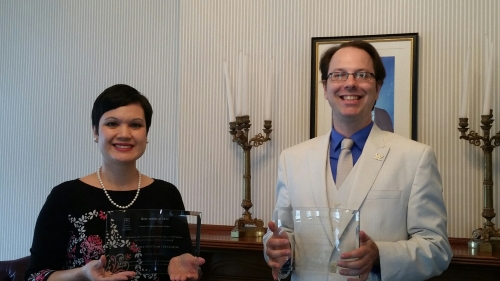Wayne State social worker, anthropologist win journal's best article award

A social work journal has honored two Wayne State-affiliated researchers with its Best Article for 2014 award for research demonstrating fruitful integration of social work and anthropology.
The Journal of Sociology and Social Welfare presented Assistant Social Work Professor Richard Smith and Tara Eaton, research consultant to a Wayne State School of Medicine federal research grant, with the award last month in Chicago during the Society for the Study of Social Problems Annual Meeting. The two were honored for "Information and Communication Technology [ICT] in Child Welfare: The Need for Culture-Centered Computing," which analyzes the introduction of ICT to child welfare practitioners using two anthropological constructs: communities of practice and culture-centered computing.
The study included analysis of archived interviews with nearly 400 child welfare workers conducted during the decade following California's adoption of new case management software for improved efficiency and service delivery. Smith and Eaton determined these workers fit the anthropological concept of a community of practice in that they shared a common sense of professional identity, language, objectives, routines, and norms for behavior, and engaged in "situated learning" within a unique social and physical environment.
The study found that in early years following adoption of the new software, the community of practice underwent changes viewed by members as negative, such as spending more time on phone calls and documentation, spending more time alone and less time with co-workers, experiencing less supportive and more performance-oriented relationships with supervisors, and having less time to serve children and families. In early years, respondents also noted that the new software consumed more of the social workers' time, prompting some to resign in frustration, while others questioned its stated goals of saving time and money. Toward the end of the study period, however, comments about the system became less frequent and more positive as newer workers discussed improved system training and access to information about clients.
Eaton and Smith's findings suggest that the introduction of ICT to the California child welfare system would have benefited from culture-centered computing, a system development process that considers socio-cultural dynamics and the context of technology use, and which allows users to have a role in the design of technology. Eaton, who has a Ph.D. in organizational anthropology from Wayne State and completed a post-doctoral research fellowship in Wayne State's School of Medicine (SOM), said that new ICT decisions within organizations frequently focus on potential efficiency gains rather than the cultural fit of the technology, which is just as important. She noted that the study's findings are applicable to other care settings outside of child welfare work, such as in health care.
"The development and implementation of new ICT for patients or providers should take user preferences and the cultural contexts of use into consideration to promote acceptance and lasting adoption of ICT," said Eaton, who is co-investigator and research consultant for "eHealth Activity among African American and White Cancer Survivors," a four-year, $1.8 million grant at Wayne State funded by the Agency for Healthcare Research and Quality and led by Hayley S. Thompson from SOM's Department of Oncology and the Barbara Ann Karmanos Cancer Institute.
Smith and Eaton are among a growing number of researchers who are realizing the benefits of integrating theories and perspectives from social work and anthropology. Demand for formal training in the application of both disciplines led the School of Social Work to develop one of the nation's few joint Ph.D. degrees in Social Work and Anthropology (SWAN), which began accepting students this fall.
"I think social work is dominated by psychology, however many of the things we do and the problems we are interested in are also informed from an anthropological perspective," said Smith, an expert in community development. "The anthropological approach to research is akin to what social workers in child welfare have done historically, which is develop an in-depth relationship with children and families where they live."
Wayne State's SWAN program this fall will host "Drug Dealers, Policy Makers, and Other Hidden Populations: A Career in Code Switching," by Luke Bergmann, senior director of the Office of Behavioral Health at NYC Health and Hospitals Corporation. The date and location will be announced at the program's website, http://clas.wayne.edu/swan/.